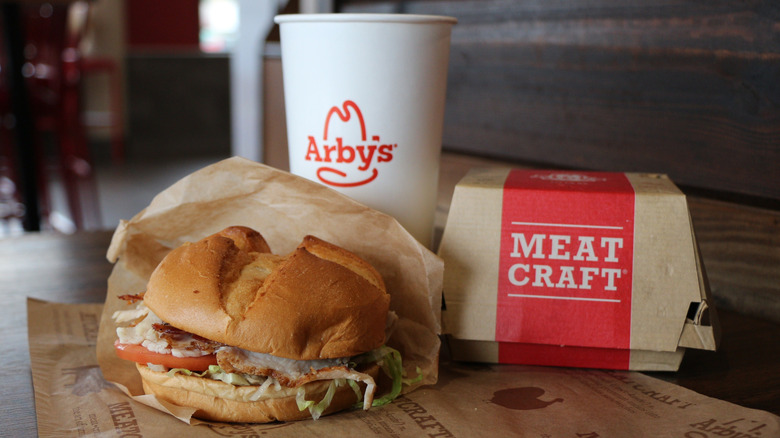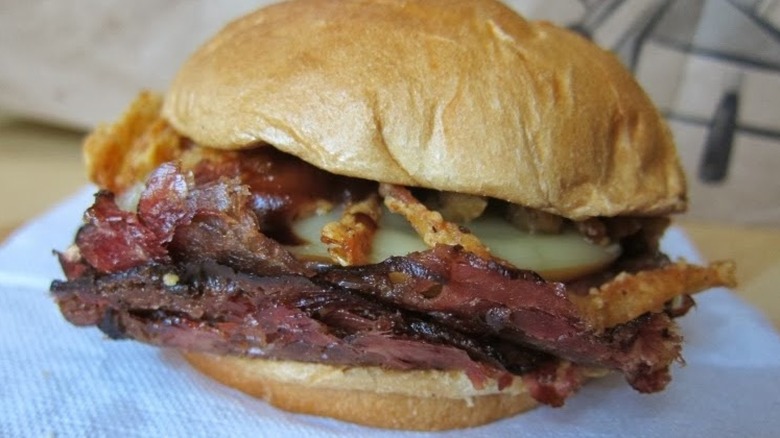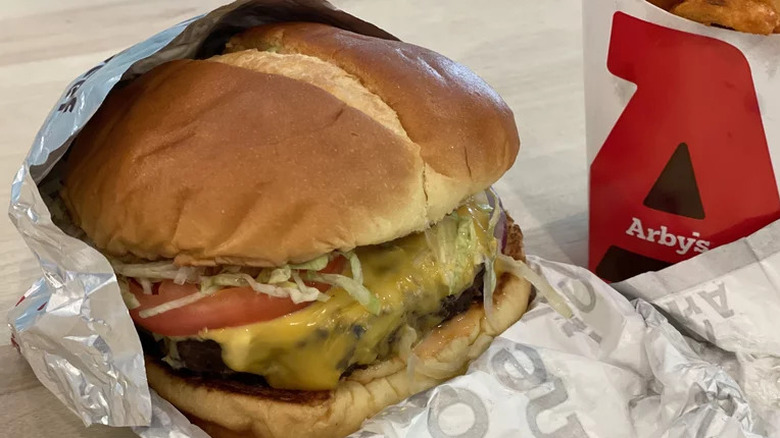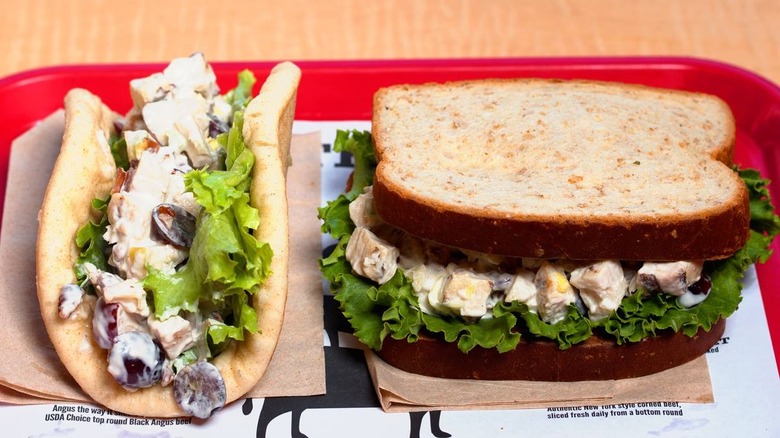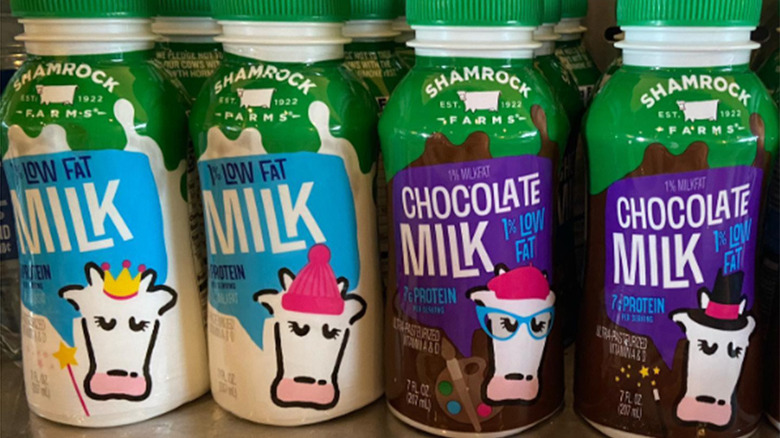Things You Should Know Before Your Next Visit To Arby's
With an on-the-nose yet comical slogan, a strong hold on the curly fry market, and a top fast food alternative to the classic hamburger, Arby's has proven time and time again why it's managed to stick around for 60 years. The restaurant's Classic Roast Beef sandwich has remained relatively unchanged since its debut in 1964. Founded by brothers Forrest and Leroy Raffel, Arby's was a product of wanting to think outside the box. As fast food became increasingly popular in the 1960s, the brothers looked to cash in on an untapped market. "Well, we wanted to do something different," Leroy Raffel told Metro Monthly in 2014. "Nobody was doing roast beef and that's what we did."
As of 2024, there are over 3,400 Arby's locations throughout the United States, putting the restaurant comfortably among the 20 largest fast food chains in the country. With thousands of locations and decades of success, Arby's has cemented its legacy as one of the most trusted names in the industry. But that doesn't mean there hasn't been the occasional hiccup for the roast beef giant. From questions behind its iconic sandwich to shocking details behind the fast food chain's most popular items, check out some of the shadiest things about Arby's menu.
The roast beef comes in a solution
For anyone who's ever worked in a fast food kitchen, you'd know that it's nearly impossible for menu items to be made from scratch quickly. In order to accommodate the demand for mass quantities of food in a short amount of time, fast food restaurants often opt for ingredients that are pre-assembled to some degree. For instance, many fast food chains such as Burger King, McDonald's, and White Castle use frozen hamburger patties in an attempt to cut down on food prep time. As a restaurant that strives to be the hamburger alternative, Arby's employs its own time-saving strategy to maximize kitchen efficiency.
Perhaps one of the biggest questions regarding Arby's is how the restaurant can prepare its roast beef. According to several current and former Arby's employees on one Reddit thread, the restaurant does in fact cook its famous roast beef in each store. However, it's the fast food chain's preferred cooking method that may seem quite odd to some of the restaurant's fans.
"I worked in an Arby's when I was a kid. It's solid meat. I think where people get confused is that the meat does come in bags that have liquid for basting," wrote one Redditor. Despite the roast beef's somewhat odd cooking method (for fast food, anyway), you can rest assured that you're getting real meat.
Arby's faces a lawsuit over its advertising
So, you've ordered a Classic Roast Beef sandwich and are now breathing a sigh of relief that your meal contains authentic beef. Everything is perfect, right? Well, according to a lawsuit filed in September 2023, you still might not be getting exactly what you're expecting. Joseph Alongis filed his class action lawsuit alleging that Arby's has been engaging in "unfair and deceptive trade practices." The basis of the complaint centers around Arby's advertising of some of its most popular menu items. Alongis alleges that the fast food chain has purposefully advertised the incorrect amount and quality of several of its sandwiches.
In the lawsuit, Alongis provided official advertisement pictures of the Arby's menu items in question. He then offered up photos of the menu items that he had personally purchased, which failed to match the advertisement's portrayal. Some of the menu items included the Classic Roast Beef Sandwich, the Classic Beef 'N Cheddar, the Half Pound Beef Sandwich, and the Smokehouse Brisket Sandwich. Alongis alleges that the restaurant overstated the amount of meat on each sandwich by double what is actually served to customers. For now, the lawsuit is still pending. So, we'll have to wait and see if Arby's does in fact have the meats.
The Wagyu burger had questionable origins
If you look up the definition of irony in the dictionary, you might just see the picture of Arby's Wagyu Steakhouse burger. For a restaurant that got its start trying to distance itself from the fast food burger chains, it seems a bit odd that it would ever offer a burger to its customers. But that's exactly what Arby's did in 2022 when it released the Wagyu Steakhouse burger. At a whopping 6.4 ounces, the burger was not for the faint of heart. Despite its massive size, the burger scored fairly well among reviewers. However, there was one small detail that left a little confusion for burger enthusiasts — did Arby's use real Wagyu beef?
According to the American Wagyu Association, Wagyu is a breed of Japanese cattle known for its higher concentration of marbling in the meat due to the fat stored throughout the muscle tissue. American Wagyu is often the result of breeding Japanese Wagyu with other cattle. With Arby's Wagyu Steakhouse burger, the fast food chain used a blend of 52% American Wagyu beef and 48% ground beef.
So, did Arby's truly have an authentic Wagyu burger? That depends on who you ask. Although it could be considered somewhat misleading, utilizing a Wagyu blend is certainly the most practical option for the restaurant, especially for Arby's accounting department.
Arby's cheese sauce is packed with preservatives
When it comes to indulging in a satisfying snack, cheese is usually at the top of people's guilty pleasures list. Whether it's melted, deep fried, or just eaten straight out of the bag, cheese always seems to hit the spot in a way that other foods just can't seem to reach. Luckily for Arby's fans, the restaurant chain has plenty of options on its menu to scratch that cheesy itch. There is one downside to reaching for a classic Arby's Beef 'n Cheddar though. That rich and creamy cheese sauce packs a potent punch of preservatives.
But before we talk about what's in the cheese sauce, we should probably mention what's not the main ingredient. According to Arby's website, the first ingredient in its cheddar cheese sauce isn't even cheese. Instead, it's water. In fact, cheddar cheese isn't listed until the fourth ingredient. Canola oil and modified cornstarch make their way in before cheddar cheese is even mentioned.
However, it's what's listed after cheddar cheese that might give Beef 'n Cheddar fans some doubt over what to choose for their next sandwich. That's because preservatives such as maltodextrin, sodium citrate, sodium stearoyl lactylate, and sodium hexametaphosphate make their way into the gooey and cheese-flavored concoction.
Arby's bread was banned in certain countries
For any restaurant that features a sandwich-heavy menu, you can almost guarantee that plenty of attention has been paid to the bread. A sandwich's contents can only carry it so far before its shortcomings become apparent. For a fast food chain like Arby's, the bun can easily make or break a sandwich. If it's too soft, the bun can become soggy and fall apart in a person's hands while they're eating a sandwich. If the bun is too hard, it can become a downright chore to make it through lunchtime while chomping on your roast beef sandwich. Finding that perfect balance is key. But what about the rest of Arby's bread offerings?
Surprisingly, just one added ingredient in a couple of Arby's bread products would prevent them from ever being sold in the European Union. The ingredient is azodicarbonamide, which has been banned in several countries. The chemical serves two purposes. Its first use is as a dough bleach and leavening agent. Arby's uses azodicarbonamide in its croissants, French toast sticks, and sourdough breakfast bread.
The second use of azodicarbonamide is found well beyond the kitchen, as it is also used as a foaming agent in rubber materials such as yoga mats. That's not exactly a delicious combination, though it's been approved as a food additive by the FDA.
Much of the menu is high in sodium
If you're craving a fast food meal, you're most likely not too worried about the most healthy meal options available. One of the perks of eating fast food is having a chance to order a filling meal in a short amount of time. Unfortunately, that usually requires sacrificing a health-conscious diet. With Arby's menu items consisting of deep-fried foods and cheese-slathered sandwiches, the restaurant chain boasts a collection of food that would make any dietician wince. Perhaps one of the most impactful aspects of any diet would be the good ol' sodium intake.
According to the FDA, the basic dietary guidelines for the average person suggest a maximum of 2,300 milligrams of sodium per day. That might sound like a lot, but the sodium can quickly pile up depending on what you eat. For much of the Arby's menu, items can often top 2,000 milligrams of sodium. Take the Double Beef 'n Cheddar for example. Consuming one of these sandwiches will see you add 2,100 milligrams of sodium. And that's before the fries and soft drink. But one of Arby's biggest sodium offenders is the Classic French Dip & Swiss sandwich. Topping out at 2,550 milligrams of sodium, this sandwich fulfills your daily intake and then some.
The Market Fresh menu isn't as healthy as it sounds
One of the most shady things about Arby's menu just might be its Market Fresh menu. With the illusion of offering more health-friendly options that won't leave customers feeling guilty, the Market Fresh menu is just as guilty of piling up the calories as the classic menu. Undoubtedly, the most diet-busting offering on the Market Fresh menu is the Corned Beef Reuben. The sandwich may come in at a respectable 680 calories, but the sodium levels are high enough to make anyone think twice about ordering the corned beef. At 2,420 milligrams of sodium for just a single sandwich, the Corned Beef Reuben isn't exactly the most fresh sandwich available on the market.
Usually, if you see a wrap on a menu somewhere, you might assume that you're looking at a more waist-friendly option. But Arby's Crispy Chicken Club Wrap is possibly the fast food chain's biggest trap menu item. With crispy chicken, bacon, lettuce, tomato, red onion, cheddar cheese, and honey mustard, the wrap doesn't look like an unhealthy option. But taking a closer look at the nutrition facts tells the full story. At 97 milligrams of cholesterol per serving, the Crispy Chicken Club Wrap accounts for nearly half of your suggested daily intake.
The milkshakes pack a sugary punch
Sometimes it's just too hard to pass up a good milkshake. The not-quite ice cream and not-quite beverage has been a fast food restaurant staple for decades. From a mid-day treat to a tasty way to cool down on a hot summer day, milkshakes can often be the perfect way to cap off a meal for your lucky taste buds. And if you're pulling up to Arby's to grab one of those half-frozen treats, you'd be picking one of the better-tasting milkshakes in fast food today. But like all things that usually taste good, eating (or drinking) an Arby's milkshake comes with its very own trade-off.
It probably doesn't shock you that Arby's milkshakes are packed with sugar. You likely even considered the impending sugar binge and bought one anyway. But what might surprise you is just how much sugar Arby's jams in every one of those delectable treats. A timeless regular-sized Vanilla Shake comes in at 64 grams of sugar, which is nearly double the recommended daily sugar consumption by the American Heart Association. But sometimes you just want to go big or go home, right? Ordering a large Chocolate Shake from Arby's will pack in a whopping 118 grams of sugar. That's over 28 teaspoons. Talk about a sugar rush.
Its milk supplier has a questionable history
Sooner or later, every company is going to face a controversy or two. Whether it's a massive corporation or a small-time mom-and-pop shop, it's nearly impossible to always be one step ahead of some negative press now and then. Ultimately, it's up to the public to gauge whether or not a company has atoned for its sins. Shamrock Farms, the primary supplier of milk products for Arby's kid's menu, has been around for over 100 years and has seen its fair share of controversial moments.
Founded in 1922, Shamrock Farms has worked its way from a small-time family business to Arizona's largest dairy supplier. In 2008, Shamrock Farms was accused of providing inadequate pastures for its cows and keeping its animals inside for weeks on end. The Cornucopia Institute even went as far as suggesting that Shamrocks Farms should lose its status as an organic producer of milk, alleging an intentionally deceptive marketing strategy to its consumers.
In 2019, Shamrock Farms once again found itself in hot water when the company was forced to issue a recall of 2% reduced-fat vanilla gallon milk. Shamrock Farms reported that due to cross-contamination, the milk tested positive for a tree nut allergen. Without proper labeling, the milk posed a threat to those suffering from tree nut allergies.
